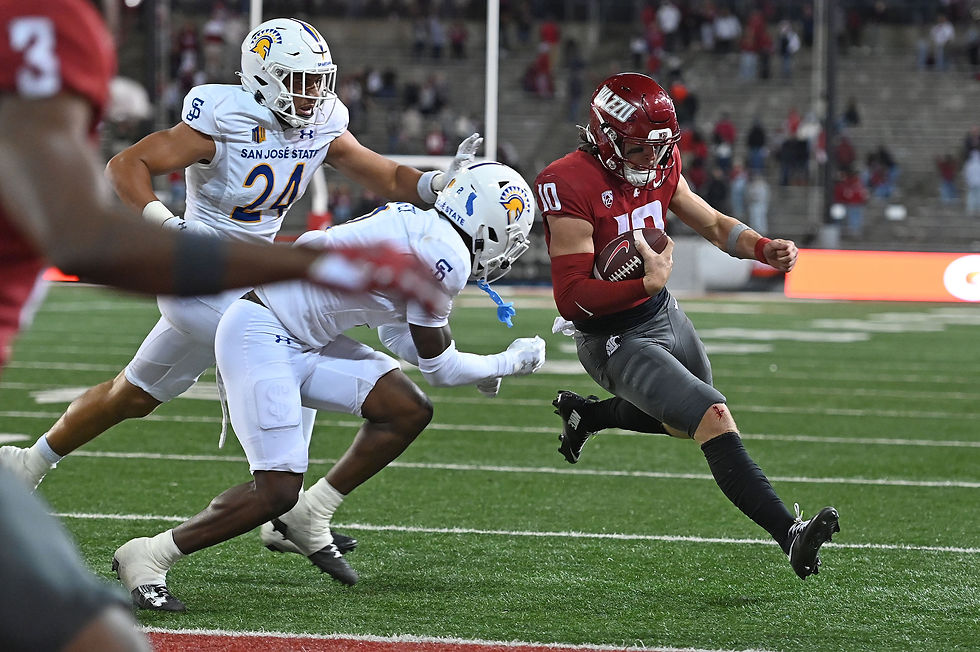In an Interesting Twist, Pac-12 Sues Mountain West Conference
- Dominic Ambrose
- Sep 24, 2024
- 3 min read
Updated: Sep 25, 2024

As the college football landscape tries to settle from the latest seismic shift, the anticipation surrounding the next wave of realignment is nearing a fever pitch. In an interesting development, the Pac-12 Conference has entered into the realm of legal challenges by suing the Mountain West Conference.
The Story So Far
Currently, the Pac-12 is in a state of limbo. While the bulk of its schools departed for the Big Ten, Big 12 and ACC conferences, the conference and its two remaining members, Washington State and Oregon State, have sought a way for the conference to remain in the landscape of college football. While the Pac-12 decided to use the 2024 season to weigh its options, the NCAA allowed the two schools to operate as a two-team conference for two years (2024-25) in a grace period. The Pac-12 also agreed to play seven football games with Mountain West Conference members while paying $14 million to the MWC.
The grace period allowed by the NCAA means that the Pac-12 Conference has until 2026 to add eight members and be recognized as a conference by both the NCAA and the College Football Playoff. The first tremor was the Pac-12 extending invitations and adding Boise State, Fresno State, San Diego State and Colorado State from the Mountain West. After being turned down by American Athletic Conference schools Memphis, UTSA, Tulane and South Florida, the Pac-12 quickly returned to the Mountain West to add more members.
Financial Ramifications of Realignment
While the lawsuits involved in conference realignment are not new (see Clemson and FSU), this is the first one between two conferences. As part of teams leaving conferences, those teams involved often have exit fees that need to be paid. In this instance, Mountain West teams would need to pay an exit fee of more than $17 million per school. The added wrinkle is that in the agreement for the games to be played, there is a "poaching fee" penalty beginning at $10 million and increasing by $500,000 per departing school. With the four schools already involved, the total owed to the Mountain West would be $43 million.
What it All Means
For the Mountain West Conference
The fees and money are meant to be a deterrent for schools in the conference to go to a different conference. The Mountain West saw four of its member schools position themselves to depart for the Pac-12. It wants to remain relevant and survive in the ever-shifting landscape of college football and conference realignment. The conference's goal is to make the fees so high that other conferences don't want to leave. On Tuesday afternoon, MWC commissioner Gloria Nevarez released a statement about the lawsuit.
For the Pac-12 Conference
Similar to the Mountain West, the Pac-12 wants to remain relevant in college football. The best way for it to do that would be to welcome geographically relevant schools to a new version of the Pac-12. The lawsuit, filed as an antitrust complaint, states that with the fees, the Mountain West already has sufficient compensation from the exit fee amount and that the "poaching" penalty only serves to increase the conference's profits.

The Effect on College Football
As teams and college football as a whole inch closer to football-only entities or super conferences, the odd conference out at the moment is the Pac-12. The conference adding teams from the Mountain West makes sense as the two conferences have geographic proximity to each other. The Pac-12 grace period also coincides with the re-evaluation of the bowl games. This just adds more fuel to the fire for both conferences to remain relevant in the eyes of the CFP and college football.

.png)
_edited_edited.png)


.png)
.png)
Comments